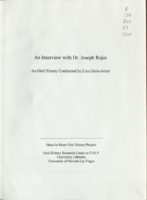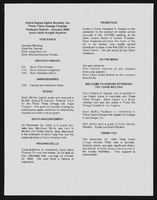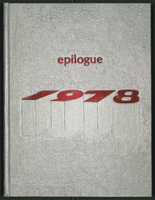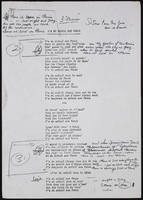Search the Special Collections and Archives Portal
Search Results

Transcript of interview with Dr. Joseph Rojas by Lisa Gioia-Acres, September 30, 2008
Date
Archival Collection
Description
Dr. Joseph Rojas, born 1933 in Alexandria, Louisiana, was the son of Joseph Edward Rojas and wife Carroll. He graduated high school at age 16 and entered Loyola University of the South. Two years later he was accepted at Louisiana State University School of Medicine, graduating with a medical degree in 1957. He interned at Charity Hospital and then completed his OB-GYN residency at Tulane University. Several mentors worked with Dr. Rojas during his residency and he recalls learning surgical and bed-side skills from the likes of Dr. Lynn White and Dr. Fred Janson. He also remembers the very high volume of patients - up to 300 - that he and other residents saw daily. Dr. Rojas married Mona Robicheaux, RN, during his residency and afterwards joined the Air Force. He and his family — they eventually had six children — were stationed at Nellis Air Force Base, arriving in Las Vegas in 1961. He was chief of OBGYN and deputy hospital commander while at Nellis and then served as chief of OBGYN at Southern Nevada Memorial Hospital until 1972. He later served as chief of staff at Women's Hospital and Valley Hospital, and was the first chief of staff at Summerlin Hospital. Dr. Rojas also maintained a private practice outside of the hospital. His wife worked alongside him in his office, and they share memories and anecdotes of the patients they saw and the general atmosphere of the medical community. Both Joseph and Mona agree that Las Vegas hospitals were less racially segregated than the hospitals in Louisiana, and felt that the West was more open to integration. In 1966 Dr. Rojas started the first OB-GYN residency in Nevada, which led to the development of the University of Nevada School of Medicine. He was a researcher, lecturer, teacher, and author. He earned many awards, including the Harold Feikes MD Award for Outstanding Physician in Clark County (2001), and the Nevada State Medical Association Distinguished Physician Award (1980). Dr. Rojas passed away in May of 2009, leaving behind an incredible legacy of service to the residents of Clark County.
Text

Alpha Kappa Alpha Sorority, Theta Theta Omega Chapter "Hodegos" reports
Date
Archival Collection
Description
From the Alpha Kappa Alpha Sorority, Incorporated, Theta Theta Omega Chapter Records (MS-01014) -- Chapter records file.
Text

Carol Frey oral history interview: transcript
Date
Archival Collection
Description
Oral history interview with Carol Frey conducted by Claytee D. White on March 30, 2018 for the Remembering 1 October Oral History Project. In this interview, Carol Frey discusses her work as a volunteer for the Trauma Intervention Program (TIP) of Southern Nevada. She specifically talks about the October 1, 2017 mass shooting in Las Vegas, Nevada and her volunteer efforts at one of the hospitals, where she provided support for survivors of the shooting, answering any questions they had, calling family members, arranging transport of loved ones to Las Vegas, and any other assistance that was needed, either emotional or practical. Throughout the interview, Frey discusses the moments that have stuck with her, including the gestures of gratitude the TIP volunteers had received from United Health Care employees and Sandy Hook High School students.
Text

Transcript of interview with Adelaide Robbins by Lisa Gioia-Acres, April 18, 2008
Date
Archival Collection
Description
Adelaide was born in Manhattan, New York to a father who was a pianist and arranger and a mother who was a dancer on Broadway. She grew up as an only child in the theater district where she was exposed to the arts from a young age. Her parents insisted she be well rounded. To that end, she began piano lessons at age six and was frequently taken to museums. Adelaide was always drawn to music and began working professionally by the age of 12. She attended the High School of Music and Art for four years along with others who went on to great fame. While in high school, she earned awards for composition. Her knowledge and abilities of the bass earned her a full scholarship to the Eastman School of Music. All of the jobs she had during high school and college were music related; playing gigs or teaching. While working towards a triple major at Eastman, she felt over-extended and eventually transferred to the Manhattan School of Music who was honored to have a transfer from Eastman. Also because of the extra credits from Eastman, she was able to obtain a master’s degree inside of a year. Adelaide went on the road with Buddy Rich’s band where they played in Chicago and Los Angeles before finding their way to Las Vegas. Adelaide was always the only woman in the band, and there were difficulties of being a woman in the field of mostly male musicians. The band found their way to Las Vegas in 1967. She never realized how well known she was until she arrived in Las Vegas. Adelaide came to Las Vegas on a trial run and ended up staying. The first job she had in Las Vegas was playing solo piano at Guys and Dolls before moving on to playing as a rehearsal pianist for a Broadway show. Over the years, Adelaide played many venues with many famous musicians. She is not hopeful for the future of musicians in Las Vegas, feeling the casino owners would rather replace live musicians with canned music. However, Adelaide’s career is not over as she is still performing for a variety of events. With her two degrees from very prominent music schools, Adelaide feels she may have gone further in career if she had stayed in New York, but she has no regrets about coming to Las Vegas.
Text
C. A. Earle Rinker Photograph Collection of Goldfield, Nevada
Identifier
Abstract
The C. A. Earle Rinker Photograph Collection of Goldfield, Nevada (approximately 1900-1915) contains individual black-and-white photographic prints, photographic albums, black-and-white and tinted postcards, and photographic negatives that document the history of early twentieth century Goldfield, Nevada. The images include photographic prints of Goldfield and surrounding areas during its peak years of 1906-1910; postcards showing scenes of Goldfield, Tonopah, and other areas in central Nevada; and negatives that contain images of Rinker's family and homelife in Indiana and Illinois.
Archival Collection

Meeting minutes for Consolidated Student Senate University of Nevada, Las Vegas, Febuary 28, 1985
Date
Archival Collection
Description
Text
Marie and James B. McMillan Photograph Collection
Identifier
Abstract
The Marie and James B. McMillan Photograph Collection (1900-1994) contains photographs of Marie and James B. McMillan and their families. The collection also includes photographs of their friends and professional associates, including journalist Hank Greenspun, Nevada civil rights pioneer J. David Hoggard, and entertainer Sammy Davis Jr. Marie McMillan is a former Las Vegas, Nevada flight instructor and one of the first women to work at the Nevada Test Site in Nye County, Nevada. James B. McMillan was the first African-American dentist to practice in Nevada, as well as a prominent Nevada civil rights leader.
Archival Collection

Photographs of Ginseng BBQ signs, Las Vegas (Nev.), 2002
Date
Archival Collection
Description
Site address: 3765 S Las Vegas Blvd
Sign details: Down the driveway created between the Fatburger and Walgreen's structure is a slightly larger lot, which is home to the Ginseng BBQ establishment. The signage is a gateway, banner structure which leads to this slightly larger lot. It is visible standing directly in front of the Fatburger sign, looking east down the alley.
Sign condition: Structure 3 Surface 3 Lighting 3
Sign form: Pylon
Sign-specific description: Attached to the section of the Fatburger building which houses the entrance to the Alan Albert's, and stretches across to the building which houses Walgreen's is a sign which is comprised of a horizontal overhead structure of steel beams, forming a lattice work or skeleton of an entrance. The top and bottom edges are white raceways with incandescent bulbs. Placed awkwardly along the bottom portion of the skeleton is a border of gold polished raceways with incandescent bulbs. There is no backing to the border, so it is simply an edge and nothing more inside this border consisting of the structure of the sign. The top and bottom edges of the structure are lined with incandescent bulbs. "Ginseng BBQ" is spelled in gold channel letters painted white on the inside, with red neon in the interior. The letters are all caps and centered inside the border. The sign faces west. The actual establishment is further east. through the gateway where a slightly larger lot is located, on the north face of the Walgreens side of the complex.
Sign - type of display: Neon; Incandescent
Sign - media: Steel
Sign animation: Chasing, flashing, oscillating
Notes: The text, which resides on the southern wall and reads "Casino," is filled with incandescent bulbs that all illuminate at the same time, and oscillate. They then shut off at the same time, and then repeat. The raceways of incandescent bulbs chase each other while the neon, which surrounds the back lit, plastic, screens on this wall flash on then off. The bottom two raceways sandwiching the reflective panel chase from left to right, while the remainder of the raceways surrounding the signs, run right to left. The incandescent bulbs on the pylon chase each other gracefully up the length of the pylon. The animation is patterned so as to appear as if a section of several bulbs are pulsing its way up the towers, hugging the edge of the bulbous tops. The raceways continue around the east face of the building. The umbrellas in the plaza behind the pylon, also are animated with incandescent bulbs chasing each other downward along the raceways.
Sign environment: The environment which the Ginseng BBQ's establishment shares is dictated by its neighbors of Walgreen's and Fatburger. The small enclosure of a lot, which is in front of the store, follows after passing underneath the main logo text banner for the restaurant. It is hidden among the various neighboring businesses, being protected by the larger structure in front of it.
Sign manufacturer: Vision Sign
Sign - thematic influences: No real theme surrounds the signage other than it appears that it was pieced together from various other pieces of signage. The white, steel skeleton appears as if it was there previously, and the Ginseng sign was attached later. The theme that it does fit into is the small eateries which pop up among the strip malls and small shopping centers along the strip. It is also one of two different Ginseng BBQ establishment.
Surveyor: Joshua Cannaday
Survey - date completed: 2002
Sign keywords: Chasing; Pylon; Neon; Incandescent; Steel
Mixed Content

Epilogue: UNLV Yearbook, 1978
Date
Description
Yearbook main highlights: schools and departments; detailed lists with names and headshots of faculty, administration and students; variety of photos from activities, festivals, campus life, and buildings; campus organizations such as sororities, fraternities and councils; beauty contest winners; college sports and featured athletes; and printed advertisements of local businesses; Institution name: University of Nevada, Las Vegas
Mixed Content

